- Clone
- 18G102B2E11 (See other available formats)
- Regulatory Status
- RUO
- Other Names
- Transcription factor A, mitochondrial, mtTFA, MtTF1, TCF6, TCF-6, Transcription Factor 6
- Isotype
- Mouse IgG2b, κ
- Ave. Rating
- Submit a Review
- Product Citations
- publications
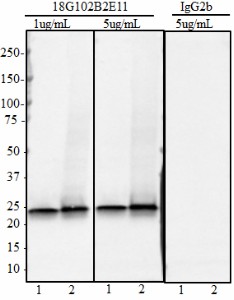
-

Western blots of anti-TFAM antibody (clone 18G102B2E11) and isotype-matched control mouse IgG2b. Lane 1: 20 µg of normal human brain lysate; Lane 2: 20 µg of human brain membrane lysate. Blots were incubated overnight at 4°C with 1 or 5 µg/ml of primary antibodies, followed by incubation with horseradish peroxidase labeled goat anti-mouse IgG secondary antibody. Enhanced Chemiluminescence was used as the detection system. -

IHC staining of anti-TFAM antibody (clone 18G102B2E11) and isotype-matched control mouse IgG2b on formalin-fixed paraffin-embedded normal human brain tissue. Following antigen retrieval using sodium citrate and 0.25% triton X-100, the tissue was incubated with primary antibodies at 5 µg/ml overnight at 4°C. Tissue-bound antibody was detected using BioLegend’s Ultra Streptavidin (USA) HRP Detection Kit and DAB (3,3'-diaminobenzidine) substrate. -

| Cat # | Size | Price | Quantity Check Availability | Save | ||
|---|---|---|---|---|---|---|
| 850501 | 25 µg | $136 | ||||
| 850502 | 100 µg | $335 | ||||
TFAM (Transcription Factor A, Mitochondrial) binds to the mitochondrial light strand promoter and functions in mitochondrial transcription regulation, and DNA replication and repair. The protein is required for accurate and efficient promoter recognition by mitochondrial RNA polymerase. Sequence polymorphisms in the TFAM gene are associated with Alzheimer's and Parkinson's diseases. Other diseases associated with TFAM include Mitochondrial DNA Depletion Syndrome, Hepatocerebral Form and Deoxyguanosine Kinase Deficiency.
Product DetailsProduct Details
- Verified Reactivity
- Human
- Antibody Type
- Monoclonal
- Host Species
- Mouse
- Immunogen
- Full-length human TFAM protein
- Formulation
- Phosphate-buffered solution, pH 7.2, containing 0.09% sodium azide.
- Preparation
- The antibody was purified by affinity chromatography.
- Concentration
- 0.5 mg/ml
- Storage & Handling
- The antibody solution should be stored undiluted between 2°C and 8°C.
- Application
-
WB - Quality tested
IHC-P - Verified - Recommended Usage
-
Each lot of this antibody is quality control tested by Western blotting. For Western blotting, the suggested use of this reagent is 1.0 - 5.0 µg per ml. For immunohistochemical staining on formalin-fixed paraffin-embedded tissue sections, the suggested use of this reagent is 1.0 - 5.0 µg per ml. It is recommended that the reagent be titrated for optimal performance for each application.
- Application Notes
-
This antibody recognizes endogenous TFAM in human brain tissues in WB and IHC applications but does not recognize mouse TFAM.
-
Application References
(PubMed link indicates BioLegend citation) -
- Wang YE, et al. 2013. PLoS One 8(8):e74513. (WB)
- Caielli S, et al. 2016. J Exp Med. 213(5):697-713. (WB)
- Product Citations
-
- RRID
-
AB_2716009 (BioLegend Cat. No. 850501)
AB_2716009 (BioLegend Cat. No. 850502)
Antigen Details
- Structure
- TFAM is synthesized as a precursor form with a mitochondrial targeting peptide, which is removed by processing after import to the mitochondria. Mature TFAM has an apparent molecular weight of ~25 kD. Alternative splicing results in multiple transcript variants.
- Distribution
-
Tissue distribution: Central nervous system, skin, kidney, lung, thyroid, lymph nodes, breast, esophagus, and heart.
Cellular distribution: Mitochondrion, nucleus, and cytosol. - Function
- TFAM functions in mitochondrial transcription regulation, and DNA replication and repair.
- Interaction
- TFB1M, TFB2M, CLPX
- Biology Area
- Cell Biology, Mitochondrial Function, Neuroscience, Neuroscience Cell Markers, Transcription Factors
- Molecular Family
- Mitochondrial Markers
- Antigen References
-
1. Bestwick ML, Shadel GS. 2013. Trends Biochem Sci 38(6):283-91.
2. Ramachandran A, et al. 2017. Nucleic Acids Res 45(2):861-874.
3. Günther C, et al. 2004. Neurosci. Lett. 369: 219–223. - Gene ID
- 7019 View all products for this Gene ID
- UniProt
- View information about TFAM on UniProt.org
Related Pages & Pathways
Pages
Other Formats
View All TFAM Reagents Request Custom Conjugation| Description | Clone | Applications |
|---|---|---|
| Purified anti-TFAM | 18G102B2E11 | WB,IHC-P |
| Biotin anti-TFAM | 18G102B2E11 | WB |
Compare Data Across All Formats
This data display is provided for general comparisons between formats.
Your actual data may vary due to variations in samples, target cells, instruments and their settings, staining conditions, and other factors.
If you need assistance with selecting the best format contact our expert technical support team.
 Login/Register
Login/Register 




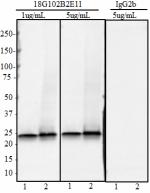
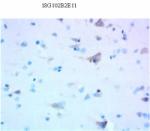
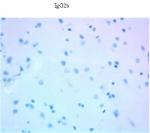
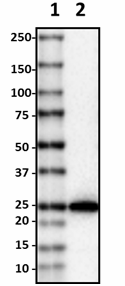



Follow Us